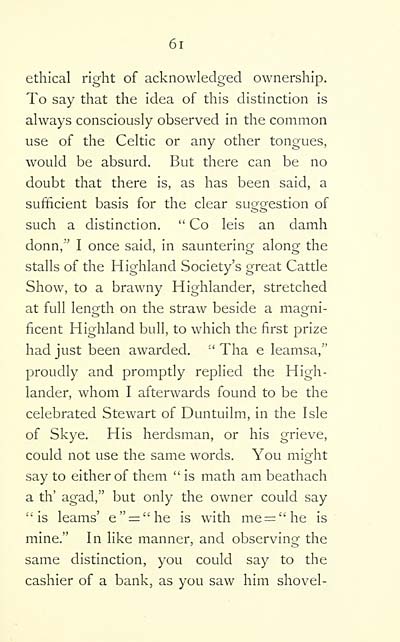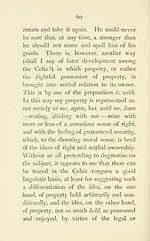Blair Collection > Vestigia celtica
(65)
Download files
Complete book:
Individual page:
Thumbnail gallery: Grid view | List view

6i
ethical right of acknowledged ownership.
To say that the idea of this distinction is
always consciously observed in the common
use of the Celtic or any other tongues,
would be absurd. But there can be no
doubt that there is, as has been said, a
sufficient basis for the clear suggestion of
such a distinction. " Co leis an damh
donn," I once said, in sauntering along the
stalls of the Highland Society's great Cattle
Show, to a brawny Highlander, stretched
at full lenofth on the straw beside a mag^ni-
ficent Highland bull, to which the first prize
had just been awarded. '■'■ Tha e leamsa,"
proudly and promptly replied the High-
lander, whom I afterwards found to be the
celebrated Stewart of Duntuilm, in the Isle
of Skye. His herdsman, or his grieve,
could not use the same words. You might
say to either of them " is math am beathach
a th' agad," but only the owner could say
"is leams' e"=:"he is with me = "he is
mine." In like manner, and observing the
same distinction, you could say to the
cashier of a bank, as you saw him shovel-
ethical right of acknowledged ownership.
To say that the idea of this distinction is
always consciously observed in the common
use of the Celtic or any other tongues,
would be absurd. But there can be no
doubt that there is, as has been said, a
sufficient basis for the clear suggestion of
such a distinction. " Co leis an damh
donn," I once said, in sauntering along the
stalls of the Highland Society's great Cattle
Show, to a brawny Highlander, stretched
at full lenofth on the straw beside a mag^ni-
ficent Highland bull, to which the first prize
had just been awarded. '■'■ Tha e leamsa,"
proudly and promptly replied the High-
lander, whom I afterwards found to be the
celebrated Stewart of Duntuilm, in the Isle
of Skye. His herdsman, or his grieve,
could not use the same words. You might
say to either of them " is math am beathach
a th' agad," but only the owner could say
"is leams' e"=:"he is with me = "he is
mine." In like manner, and observing the
same distinction, you could say to the
cashier of a bank, as you saw him shovel-
Set display mode to: Large image | Transcription
Images and transcriptions on this page, including medium image downloads, may be used under the Creative Commons Attribution 4.0 International Licence unless otherwise stated. ![]()
| Early Gaelic Book Collections > Blair Collection > Vestigia celtica > (65) |
|---|
| Permanent URL | https://digital.nls.uk/75801130 |
|---|
| Description | Celtic footprints in philology ethics and religion. |
|---|---|
| Shelfmark | Blair.1 |
| Additional NLS resources: | |
| Attribution and copyright: |
|
| Description | A selection of books from a collection of more than 500 titles, mostly on religious and literary topics. Also includes some material dealing with other Celtic languages and societies. Collection created towards the end of the 19th century by Lady Evelyn Stewart Murray. |
|---|
| Description | Selected items from five 'Special and Named Printed Collections'. Includes books in Gaelic and other Celtic languages, works about the Gaels, their languages, literature, culture and history. |
|---|

